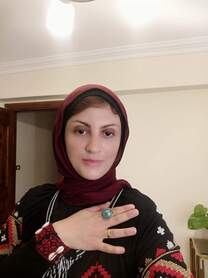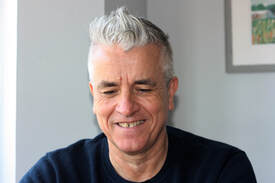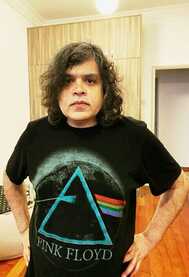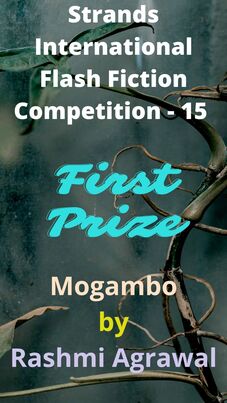|
Short Fiction ~ Rashmi Agrawal First Prize, Strands International Flash Fiction Competition - 15 Mogambo is our code word. Whenever my son, Ansh, digs his nose, my husband says Mogambo. If he bites his nails, we snap Mogambo. If Ansh says a bad word, we don’t tell him not to speak such language. We simply flick our code word. Husband takes care to never yell the word. With all his love, he curbs his disgust and chimes in, his voice singsong. Not to scare the kid but to caution him. Hinting him to keep those fingers in his pockets, not to pick the booger, not roll the muck between his fingers, and definitely not play with it like a tiny pearl between those now-dirty pads of his fingers. Mogambo has been our savior for one year now. Much earlier, when Ansh first pushed his little finger into one of his nostrils and scratched it badly, his nose bled. We explained to him, but our words spiraled down in vain. Ansh was distracted. His eyes slipped at my scratched stomach; I realized it a little too late. So, I bent myself into an arched position, shoulders slouching, my tee-shirt now touching my pajamas, covering every inch of my belly. After bruising the insides of his nose thrice in four months, he developed another new itch. Nail-biting. I was applying the second layer of concealer over the dark bags under my eyes when I noticed it. A red pinprick spot at the corner of his thumb. His cuticles were yet not disfigured, but the ends of his fingers were sore. When he had first bitten them at the corners, we simply told him not to. But we had no choice when he chewed them off to expose the skin under his nails. Keeping eyes on Ansh became our duty, an obligation. Day in, day out. We vigilantly threw him sidelong glances at least a hundred times every day to make sure his fingers stayed where they should. After a few months, we went for a day-long outing and stayed in a resort amid a lush vineyard abundant in red, green, and other grapes. Ansh loved the ambiance and picnicked thrice outside our tent-style room in a green corner. All his meals with nature. Husband and I remained inside the tent, its thick cloth-made door zipped tight. Twice, Ansh had his picnics alone, eating sandwiches, doughnuts, or egg rolls from his picnic basket. The resort was safe and familiar. When I accompanied him during his last round, his eyes searched my face, scanned my arms, then stuck on my lips. I tried to smile. He bit his nails again. I painfully pursed my chapped lips. Later that night, we watched an old Hindi movie that had lots of kids. Ansh enjoyed it until the villain, Mogambo, turned up. His ember eyes, heavy voice, and cachinnation scared him. We never streamed that movie again. And Ansh forgot Mogambo with time. Last year when he turned six, he somehow recalled Mogambo and asked about him. Husband explained: Mothers call Mogambo when kids don’t listen to parents, trouble others, and do pranks that they shouldn’t. Ansh pointedly looked at my left arm. I stretched my sleeve down and then wrapped my arms around myself. He looked scared. So was I. And when his index finger slowly reached inside his nose, my husband whispered Mogambo for the first time. The code word worked. With time, we’ve brought it into our routine, not to scare him but to remind him he is doing something he isn’t supposed to. I murmur Mogambo when he dilly-dallies in muddy puddles, still wearing his white school uniform. He starts walking in a straight line, his fingers entwined around mine. He giggles. Mogambo, I say when he picks out veggies—chunks of tomato, carrot, capsicum—from his food and throws them on the table. He notices the word if I stuff it in a rhyme and smiles with his eyes, aware of my trick. He catches the phrase if I fuse it in a lullaby. Yes, sometimes I sing to him as he has sleeping troubles. I don’t like the word Mogambo when Husband says it. Whenever he needs to say our code word, Ansh has been scared. Ansh doesn’t like it either. If he had picked his nose or bitten his nails, he is scared, more for me than himself. He knows Mogambo is a villain. Today, when Ansh enters our bedroom without a knock, Husband has to pull a sheet around himself. Mogambo, Ansh shouts, his face turns red, and his eyes well up. His fists tighten at his sides, and tears roll down his cheeks. Husband was sure Ansh wouldn’t return from the playground this soon. He didn’t care to lock the door either. Mogambo, Ansh yells again and comes closer. Husband’s belt falls while he dislodges himself from the bed and fumbles with the sheet wrapped around his waist. I wipe my tears, and he quickly exits the room, stumbling over the belt. Mogambo, my son screams loudest ever in seven years. He caresses my cheeks and wipes off the tears on my blemished skin. His not-so-clean fingers move at the blue marks around my neck and then on my arms. It hurts a little. He hands me my robe and tissue from a drawer. I wipe the blood from one side of my mouth. He looks at my bruises one after another. Mogambo, he mumbles while wrapping his arms around my neck. Mogambo is not a villain anymore. It… he is my savior. Mogambo is my safe word now. ~  Rashmi Agrawal lives in India and writes by a big window, enjoying the diverse seasons. Her words are available or forthcoming in Door is a Jar, Roi Fainéant Press, Alien Buddha, Inked in Gray, Dollar Store Magazine, Space City Underground, and others. Her short stories have found pages in various anthologies. She's working on her first novel, a psychological thriller. Nudge her @thrivingwordss.
4 Comments
Short Fiction ~ Riham Adly Second Prize, Strands International Flash Fiction Competition - 15 The siren lights from the police car parked outside colored our white-washed living-room with its angel-topped Christmas tree in red and blue. I watched Habiba as she stared at the hysterical woman screaming outside, and for the first time I noticed that our eyes were the same shade of hazel. Habiba watched in panic-stricken silence as the woman’s eyes darted between us. “Which one are you? I want my daughter back!” Mother gripped Habiba’s hands as if to say-you’re safe-you’re not leaving-you’re mine. I waited for her to look at me, but then I knew it, that unfurling truth, like the telling of secret. **** A year ago, back in school, in the locker room a figure emerged like a shadow. “Hi,” She started, singling me out. She had shoulder-length auburn hair, wore a floor-sweeping skirt and a long-sleeved shirt, all in black. It made her look small, infantile, like a lost child in a funeral. “You a nun or something,” someone said, and everyone started laughing. I wore black, too. Mine though didn’t hide as much. “Ignore them.” “I will.” “I’m Ursula.” I flaunted my name like royalty, like I was a better, perhaps more benevolent version of myself. I felt compelled to do so, like someone under a spell. Looking at hair though with those long auburn tresses made the inside of my palm itch and my skin sweat. I was all jumbled-up inside, while she looked solid, all-smiling. “Habiba.” “I had hair like that a long time ago.” I slipped a hand through my cropped hair. “We look alike you and I.” She dared. “No we don’t.” Tiny sparks ran over my neck raising every hair. She stood right next to me. We were the same height. **** “Habiba, benty, come back to me.” Her mother pleaded over and over. Outside the sirens had stopped. The Christmas tree was itself again and our living-room walls turned white — the color of the season. Everyone’s breath turned visible and words mother would utter sometimes like imposter, changeling, not mine crowded my throat. Sheriff Crowley let himself in. “Hilda, this woman outside claims you kidnapped her daughter.” Mother and Habiba’s boots coiled deep in the cold soil outside the house as they watched him take a peek at the ginger bread house and ginger bread men they built together. At the age of twelve I was already attuned to the distance spilling between us all. Daddy had ambitions that turned to ice and melted every year. I had been a good girl for both of them. Mother loved brushing my auburn tresses after her one-sided fights. He took me on hunting, fishing and even mining trips that lasted for weeks leaving her alone. Every year she would build a better and prettier gingerbread house for Christmas. When he left, I ran away after my Daddy. I looked for him in the nearby mines, at the lake, and in the far away woods on the outskirts of town. But he was gone for forever. The day they found me I opened my eyes and found her looking at me. She had eagle eyes, and claws that pulled at me and my hair. She wanted to keep on brushing and brushing till she was all good, but I wasn’t, so I looked for Daddy’s shears and hacked it off. **** When Habiba’s skirts got shorter and her tops tighter everyone at school started staring. “Are you doppelgangers now? That’s just creepy.” Ellen from Chemistry class pitched in, adding a whistle for dramatic effect, her glasses nearly falling off. “We don’t look alike. She has long hair!” It was just plain infuriating. Couldn’t they see? A couple of weeks before Christmas I invited Habiba over to my house. I was drawn to her the way a moth is drawn to flame light. I knew there was much to lose or was it? “Is your mom alright with you staying over?” Mother asked when Habiba came over. “My mother is busy. Would you like to braid my hair?” I saw it happen, the edging in of that withered smile, rekindled hope—a transformation. Mother touched Habiba’s hair with such longing it almost hurt to look at her. “Child, who works on Christmas?” Mother started brushing. “She works to forget. She hardly notices...” And just like that Habiba started telling her story. “We were deep in international waters. Men tried scooping out the water from the boat. My baby sister wouldn’t stop crying. She slipped. Baba jumped. Mama tried to jump but couldn’t and I didn’t jump.” The story ended there. “What do you celebrate then?” Mother didn’t stop brushing. “The Breakfast feast. We eat sugar cookies after the fasting month, but I don’t like them anymore. I’d rather eat gingerbread cookies.” **** I had let my hair grow back in an attempt to win my mother over again, but it was too late. “Habiba, please come back.” Habiba’s mother pleaded before reaching out for my arm. ~  Riham Adly is an award-winning flash fiction writer from Giza, Egypt. In 2013 her story “The Darker Side of the Moon” won the MAKAN award. She is a Best of the NET and a Pushcart Prize nominee. Her work is included in the “Best Micro-fiction 2020” anthology. Her fiction has appeared in over 50 online journals including Flash Back, Bending Genres, New Flash Fiction Review, Flash Frontier and Litro among others. Riham’s flash fiction collection “Love is Make-Believe” was released and published in November 2021 by Clarendon House Publications in the UK. She is the first African, Arab woman to have a flash fiction collection published in English. Short Fiction ~ Eleonora Balsano Third Prize, Strands International Flash Fiction Competition - 15 I am not fast enough, bright enough, pleasing enough. They’ve kicked me out fifteen minutes into my shift. As I walk home, the pin on my name tag biting my leg from inside my pocket, I spot the billboard. Hey student, a debt-free, happy life awaits you. Get a sugar daddy? It says in yellow characters captioning the picture of a young woman looking down to her right, where a gnarled hand touches her collarbone. The insecurity in the question mark unsettles me. Why not an exclamation mark, an infusion of confidence, a solution offered to those desperately looking for it? I call. We’ll put you in touch with one of our clients in a jiffy! Chirps the lady on the phone. An hour later I receive a call from a private number. The voice on the other side is a soft baritone, deep and warm like a knitted scarf. I say I am not a student upfront, in case that’s a deal breaker, but he just murmurs never mind, never mind and chuckles like a doting grandfather from a 1960s sitcom. We agree to meet for tea. He arrives with a drooling bloodhound in tow. I don’t know many old people, so I can’t give him an age. Anything above sixty-five probably. Or more. Or less. I am not sure what age my parents would be now. We have oolong tea and scones, he butters them for me. I wonder whether that’s what sugar daddy means; our first meeting is certainly high in carbohydrates. They drive me home and wave goodbye, the old man and Pluto the dog beside him. We could go to the Luna Park next time, he shouts as I walk away. I hear myself say yes, yes! That night I dream of a large Hello Kitty Mylar balloon flying away from me, towards outer space. In Coney Island, we have pink candy floss and I tell him about the last family, their quirks about food, how I stashed it under the bathroom sink in case they locked the cupboards. Am I oversharing? I ask him on the Ferris wheel. There’s candy floss in the sky! He replies. His eyes are shining. On our third appointment, the old man offers to cook for me. I climb the stairs to his apartment and as the door opens, I gasp. A giant Mickey Mouse is bobbing his head at me. ‘Hey everybody, it’s me! Do you want to come to my Club House?’ Mickey says, clapping his yellow-gloved hands. The old man is trapped inside, like a fly in a jar. We have a Mickey lunch of hot dog, hot dog, hot diggity dog that we share with Pluto, then the old man shows me around his house. Every room has a theme: his bedroom is a triumph of Minnie Mouses and Mickeys holding hands, the spare bedroom is filled with Donald gadgets, and the bathroom is decorated with red ribbons and black mouse ears. Do you like it? He asks, taking off his Mickey head. He’s red and sweaty underneath. I say it’s extraordinary, which in a sense is true. The old man has four children and eight grandchildren, but he hasn’t seen them in a decade. He can’t remember why. There’re many reasons and then none, he says, staring at his Mickey patent black shoes. There never is one reason, I say. There’s always one too many, he says. We lie down on the Scrooge-themed carpet and stare at the ceiling, covered in glow-in-the-dark stars. Will you find them when it’s time? He says. When..? He turns toward me and pulls down his collar. There’s a lump on the right side of his chest. A chemo port, he explains. I say I will tell them about this place. A few weeks after that, I find a new job at a bookshop. I still make almond lattes and soy cappuccinos for a living, but when there are no clients, I can leaf through the books. The old man and Pluto come by every Wednesday and wait for my shift to end. I walk them home and sometimes bake a Grandma Duck apple pie for them. He doesn’t wear the Mickey costume anymore but he keeps a pair of ears by his bed. One night the police call and say the old man is dead. The neighbors called 911 because of the putrid smell next door and they found him on his bed with Pluto at his feet, both looking like they had been asleep a very long time. He’d left my number beside the ears. I wear his Mickey costume to the funeral. His children and grandchildren look like they’ve never tasted hot diggity dogs. He loved you very much, I tell them through my Mickey grin. Then I waddle away, towards the light outside. ~  Eleonora Balsano is an Italian-born writer living in Brussels, E. U. Her short fiction has appeared on Fictive Dream, Reflex Fiction, Bandit Fiction, Ellipsis Zine, Retreat West, Twin Pies Lit and elsewhere. Eleonora is working on a novel and is represented by Zeitgeist Agency. Tweets @norami. eleonorabalsano.net Short Fiction ~ Claire Schön Honourable Mention, Strands International Flash Fiction Competition - 15 A sharp slap across both cheeks. My mottled flesh draws tight as salty moisture descends along the crease of my nose before leaping with the wind to be carried to its sea-air counterpart. Air that has kept me alive all my life, now waning. The seagulls guffaw, swoop and sail on each gust, either ignorant of what is about to pass or not accepting, as I was. The ocean calls from the pier, tempting me to ride this out in the waves of my childhood. A crust of foam crashes against the warped and weathered wood. I could slip, sweep away, but my life is no longer my own to decide. * One small, black, metal box each: a door to close in this world and open in the next. Sam selects quickly, placing his very first teddy bear next to the box. Silence. We don’t say that he could take many smaller items in place of this large one; we don’t ask him if he would prefer something to play with, something more his age – we don’t dare. None of us knows what the other is thinking anymore. But we know why he doesn’t place Mr Squeeze inside yet: he needs him more than ever, right up to the final day. Emily chooses daily, then changes her mind. Her earnest little face pains me, but I worry about her the least: she has less to forget, less to compare. Graham hasn’t mentioned his box. It’s probably filled with practical items. We’re grateful for his pragmatism: for his job, for our chance. Graham frowns at my selection. ‘The Elite,’ he spits, and, for once, I feel his dislike is genuine and not just for my benefit, ‘took too much. They’re finding it hard to settle.’ I empty my box again. What I will miss I cannot take with me: a child’s fresh, moist and earthy smell when they come in from outside, walks down my memory lanes of the seaside, other people like us. The Elite’s money hasn’t yet stretched to include everything nor everyone. * Emily closes her box; Sam hugs Mr Squeeze one last time. Graham’s box is already on site. I take mine, still empty, and place it in the boot with the lid open. I carry Mog to old Mrs Jeffries, I haven't asked her yet, but she takes her from my arms before I have the chance to speak or give Mog one last stroke, probably for the best. I admire the fickleness of my feline companion of the last five years. I place a shopping bag full of cat food just inside Mrs Jeffries’ door. A gong-like tone resounds as the tins clang against Mog’s favourite metal bowl. Mrs Jeffries looks up from her newfound furry companion and squeezes my hand; her eyes smile with forgiveness. My temples throb, deep, heavy and full of blame. We stare back at our house from the car as the Radley’s open their door. The children run to each other, chattering away like it’s any other day. Jill and Adam walk forward and pull us both close. We stand as one, for a moment, nothing and everything between us. When they let go, we can’t utter a word. What do you say when it is the last time, when it is unfair, when our children have a future, but their children won't? Who would have thought our career choices would weigh so heavily in our lives. The throbbing eases as the tears stream down my face forming a pool under my chin and dropping at regular intervals, counting down. I hand Jill our key. ‘I’m sorry,’ I sob. While Graham straps the children in, I open the boot. I grab handfuls of earth from our garden, from the grass verge outside, digging in repeatedly. My fingers burn, and I feel my nails break away from the tender connecting skin between. I kneel to dig deeper, wanting to bury myself here on this spot. I don’t stop until my box is full. I snap it shut. A smattering of earth falls from my hands onto the lid as I lower it down. We are born of the earth and should return to it when we die. Only we won’t. Graham takes my filthy hands and leads me to the passenger seat. We both know they won’t let me keep the contents of my box. Graham says nothing, and I’m grateful. I call my mum one last time from the car. ‘I love you, baby girl, kiss the small ones for me – every day.’ I hear her voice catch as she hangs up. ‘From Nanny,’ I say, turning and pecking each of their cheeks lightly, knowing that I cannot manage the big, wet smacker of a kiss my mum had intended. ‘Will we still all go to the same heaven, Mummy, with all of the people from here when we die?’ I answer that we will. I spend the rest of the journey praying to God, although I am no longer sure he is listening, that this may be true. We enter the Dome: our home for the preparation stage until we embark on our one-way journey. My dirty hands, tear-streaked, mud-smeared face, and grass-stained knees do not warrant a comment from the security staff. They don’t decline me. I am sure they have seen stranger – worse. I pick at the residual soil while we wait, smearing it in peaks resembling waves across the backs of my hands. Emily sleeps, lightly snoring a soothing whooshing sound, and Sam cuddles into her, a surrogate for Mr Squeeze. I know, with a certainty that I’m deeply ashamed of, that I would not be going through with this were it not for them. I would take my last breath, my last everything, here for as long as possible. * Sanitised, we enter our compartment. The children explore. I stare, bereft, at my washed hands. ~  Originally from the UK, Claire Schön now lives in Austria. She studied German and Spanish and is fluent in the former but useless in the latter. Claire started writing in her mother tongue in 2020 and has stories published or upcoming in a number of online and print anthologies including Reflex Fiction, Idle Ink, Funny Pearls, Fudoki Magazine, Blinkpot and Grindstone Literary. She won the Shooter Flash monthly competition at the start of 2022 and has been shortlisted and longlisted in various international competitions. Claire is currently working on her first novel. Claire tweets now and then @SchonClaire. Short Fiction ~ Richard Garcka Honourable Mention, Strands International Flash Fiction Competition - 15 That’s decided, Sam thinks. I’m semi-naked for the team videocall. A logical progression. Last Friday, he wore his cricket pads. Yesterday, it was his ex-wife’s wraparound skirt. Cross-dressing is not his thing, though he did find the experience strangely liberating. OK. As acts of rebellion go, inappropriate out-of-shot clothing is not exactly The Storming of the Bastille. What’s more, he can disable the webcam if necessary, so the risk of discovery is low. Yet, he finds the idea tantalising. What the hell. He reaches down, slips off his pyjama bottoms and lets the morning breeze from the open window do its worst. The call is as mind-numbingly dull as normal. “Right, let’s kick the tyres on this sales pipeline. I want to move the dial on those quick wins.” declares his boss, Matty, murdering metaphors with his customary relish. Sam slumps, mentally switches off and lets his mind wander. He imagines himself in the Caribbean. Bowling slow right-arm leg-breaks to the West Indies openers. The oppressive heat. The crowd barracking. His captain urging him on. Then, trying the off-break. The “wrong’un”. The classic Googly. Ball onto pad. That’s LBW surely. The whole team appeals. “Howzaaaaat!” screams Sam, leaping to his feet arms outstretched, eyes squeezed shut and mouth agape. Silence, then… “Love it! Bloody love it, Sammy-boy! Showing some real cajones there. Love it!” Sam shrieks, drops both hands protectively, then collapses into his chair, which skids backwards before clunking into a cupboard. He stares aghast at his image on the monitor, still in full view. His team are all applauding. Matty punching the air. Sliding slowly to the floor, he crawls on all fours out of shot, cheers ringing out of the speakers. Sam curls up in the corner, hugging his knees, face aflame. Trousers next time. That’s decided. ~  Richard Garcka is relatively new to writing. Following Creative Writing classes, his short fiction over the past couple of years has been published by Arts Quarter Books, Cranked Anvil, AudioArcadia and Spellbinder magazine, along with several other commendations. Short Fiction ~ Stephen Smythe Honourable Mention, Strands International Flash Fiction Competition - 15 It isn’t a redeployment interview, the letter says, it is a facilitated conversation. I’m at a small round table in a focus pod with a smiling Jasbir from HR and a stony-faced consultant whose name I’ve already forgotten. It’s my first time in this construction from another planet, cylindrical with clear sliding doors. Outside are banks of hot desks occupied by strangers staring at screens. The Council’s Transformation Team gutted the Victorian Town Hall for this soulless open-plan vision. A lad with short hair and a long beard looks up from his laptop and into the pod. I catch his eye and he turns away quickly. ‘Are you okay?’ Jasbir says. I nod even though it’s like I’m on show. ‘The pods are soundproof,’ she says. They’re also airless, sealing in the stench of the consultant’s cologne. I run my finger around the inside of my shirt collar and loosen my tie. When I pour myself some water my hand trembles and I spill a little on the table. ‘Sorry.’ The consultant, whose navy suit must have cost more than I get paid in a month, doesn’t blink. I pat my jacket pocket but can’t find a tissue to mop up the water. ‘Well, here we all are, Ged,’ Jasbir says, brightly. ‘You’ve been with the Council a while.’ ‘Since I left school.’ She checks her tablet. ‘Thirty-four years. Print manager for twenty!’ I’ve always liked Jasbir, but now she sounds like one of them. ‘Today is about matching your skill-set with current vacancies across the organisation.’ ‘In line with the Council Values,’ the consultant adds flatly. Jasbir smiles. ‘Of course, the Values.’ People … Performance … Passion … damn, what’s the fourth P? I hope they don’t ask. ‘We’ve identified a team leader position in Business Support for you,’ Jasbir says, wide-eyed, like she’s offering me a promotion instead of a wage cut. ‘Team leader? I’m a print manager!’ With a mortgage on my flat, child support for twin seventeen-year-olds, and monthly maintenance payments to my ex. I shouldn’t have to be starting all over again, not at fifty-one. ‘There is no print manager anymore,’ the consultant says. ‘The post has been dis-established, as you well know.’ ‘They shouldn’t have got rid of the Print Service. It’s not fair. People–’ ‘There is still a Print Service.’ the consultant says. ‘It’s being driven by Procurement.’ ‘What do they know about printing?’ ‘The Council decided it’s no longer cost-effective to keep the Print Service in-house.’ ‘That’s because they didn’t invest–’ The consultant holds up his hand, the strip light catching his gold cufflink. ‘The Council gave everybody the opportunity to comment on the restructure proposals.’ ‘I did comment. Nobody was listening!’ Outside, several heads jerk up. So much for the pod being soundproof. ‘Sorry. I’m … ’ ‘It’s a stressful time for everyone,’ Jasbir says. ‘Printing’s all I’ve ever known.’ ‘Try to look at this as a new opportunity,’ the consultant says. ‘The Council doesn’t want to make staff redundant. A good thing, right?’ I nod. ‘However, in return, you must demonstrate the required flexibility and move to where the business needs you.’ ‘Business? This is the public sector.’ ‘The Council requires people who are prepared to come along on its journey.’ ‘It really is a good fit for you, Ged,’ Jasbir says. ‘The team leader position.’ I sigh. ‘Where is it, again?’ ‘Business Support.’ ‘You mean Admin?’ ‘It’s not called that anymore,’ the consultant says. ‘You’ll be part of Raymond Hope’s team,’ Jasbir says. Raymond Hope. When I was print foreman, he was a cocky kid in the mailroom. He’s still full of himself. ‘Is there nothing else?’ Jasbir squints at her tablet. I hold my breath. She shakes her head. ‘Afraid not.’ ‘This team leader post – I don’t have to take it, do I?’ ‘I’d encourage you to give it serious consideration, Ged.’ ‘The letter said I’d get two job offers.’ ‘Up to two job offers,’ the consultant says. ‘What if I don’t like either of them?’ ‘That’s your choice,’ the consultant says. ‘The terms of redundancy are fair.’ This past six weeks, since I heard the Council’s plans, I’ve contacted every printer I know and all their suppliers. Plenty of sympathy but nobody’s hiring. They’ve let me keep my office for the time being while I work with Lena, an enthusiastic project manager from Procurement, preparing the printing tender documents: helping to sell off the thing I love. Lena says she’s expecting companies from across Europe to bid. When I was an apprentice, my old boss Mr Riley wouldn’t use any supplier more than ten miles away. Last night I walked the shop floor before locking up. Sheila my secretary, Rita the office manager, Jim, Annie and Levi the printers, Pete and Maggie the finishers, Del the driver, Tony and Anita the job estimators, have all gone. My footsteps echoed where once the presses roared. Along the aisles the kit was draped in ink-stained dust sheets: the old Heidelberg I’d sweated to breaking point, the guillotine blunted for the last time. ‘Ged? Jasbir says. ‘Ged?’ The water I’d spilled is still on the table. ‘They promised me a six-colour Speedmaster.’ My voice thickens. ‘Sixteen thousand sheets an hour.’ Jasbir fingers flash on her tablet. ‘I’m sending you a link to the Business Support team leader job description.’ Pride. The fourth P. They didn’t even ask me. The consultant stands. ‘Looks like we’re done.’ While Jasbir puts her tablet away, I look at my watch although I’m in no rush. I examine the back of my hand with its deep blue veins. There is ink running through them. ~  Stephen Smythe lives in Manchester, England. He achieved an MA in Creative Writing at Salford University in 2018. His flash fiction was shortlisted for The Bridport Prize in 2017 and longlisted in the Bath Flash Fiction Award, 2018. He was runner up for his micro fiction in the Bangor Literary Journal FORTY WORDS competition in 2019 and this year in the same competition his story was Highly Commended. In 2020, he had poems shortlisted and longlisted in The Eighth Annual Bangor Poetry Competition and his five minute play 'Mr Bombastic' was shortlisted in the Todmorden Book Festival Play and a Pint Competition (performance and result held over to 2021). His story 'Granny' received an Honourable Mention in The Strand International Flash Fiction competition -9. Short Fiction ~ Venkataramanan Ganesan Honourable Mention, Strands International Flash Fiction Competition - 15 A moon completely swallowed by the night sky lent a more ominous feel to the river than what was otherwise warranted. Jet black. Dark. Deep. Brooding. It was like staring into an abyss. A vast expanse of nothingness. If you were to thrust out a hand in front of you, you wouldn’t be able to spot it. The dozen people sitting waist-to-waist in the cramped confines of the rickety boat were as blind as bats. The wheezy whirring and sputtering of the complaining outboard motor was an exercise in unavoidable monotony. On a clear night, the foaming trails of white left in the wake of the swathe cut by the boat would be clearly visible. But tonight was neither clear nor usual. A chill breeze cutting across both the river as well as the worn out life vests made the tourists shiver and horripilate. “The most essential requirement of this tour is silence”, drawled the lean and cadaverous tour guide as an excited bunch of tourists formed a half circle around him in the briefing room twenty odd minutes before the actual boat ride. An unlit cigarette hung precariously from a corner of his mouth. Lit by a single dull bulb, the room had a musty and damp odour to it. Paint peeled off the walls creating random and cartographical patterns similar to that made by spontaneously formed archipelagos. A table with fine layers of dust had arrayed on them in no logical order a few brochures advertising the resort’s old glory days. The Government had more pressing priorities warranting attention, and subsidizing a once thriving “firefly park” resort was definitely not one of them. “Please do not scream or wave and most importantly do not get up from your seats. The motor would be cut by the captain, and the boat needs to be steady and balanced. No flash cameras or video. Sometimes a curious firefly may make its way into the boat and may even alight on your person. Please do not touch it.” Taking a wide berth, the boat rounded a bend and the captain manning the conveyance cut off the motor. A collective gasp escaped the mouths of the tourists. The foreboding veil of darkness was pierced by millions of miniature pin pricks of light. A small copse abutted both sides of the boat. Perched on every thicket and clump and darting between irregularly spaced trees were an uncountable number of fireflies. Tiny scatter shots of magnificent resplendence. Infinite specks of joyous light. Microscopic bursts of lambent glow. The largest firefly is about 1 inch long and is diurnal. Fireflies emit a chemically produced "cold light" from their lower abdomen. This light is either yellow, green, or pale red, with wavelengths from 510 to 670 nanometers. The iridescent glow is a paean to the most primaeval urge to which every animate being is unwittingly subservient – the satisfaction of carnal pleasure. The luminance emitters are egregious males enthusiastically trying to get the attention of their feminine counterparts. This biological intricacy was completely irrelevant for the astounded gang sitting poleaxed in the boat. The biting chill ceased to be an impertinence. A surreal sense of existential bliss enveloped the tourists as some quivering fingers shot out in various directions, while a few palms cupped around mouths gaping wide in a display of unabashed incredulity. There was a stony yet welcoming quiet all around. Fireflies flutter their wings, but their minuscule size means that unless such fluttering takes place very close to one’s ear, no perceivable sound is heard. Just as the less than avuncular tour guide had proposed, a few intrepid fireflies came wafting into the boat and settled themselves at various points. A few perched on the sturdy ropes laid across the floor for mooring purposes, while some rested on the transparent glass door that separated the captain’s compact cabin from the passenger seating. An obese youth, unable to contain his delight, leapt up, and letting out an uncontained yell of delight put out his arm in an attempt to grab at a firefly. As ill-luck and fate would contrive, at that exact moment, influenced by high tide a restless crest swelled just underneath the boat, which in an undulating pattern lolled and tilted to one side. Losing his balance, the boy teetered over the edge of the boat for a few fleeting seconds before dropping into the water. A heavy tonk or a thump akin to that generated when a boulder is plonked into the water emanated instead of the usual splash. Propelled by sheer maternal instinct, the boy’s mother lunged after him into the river. The Captain by now an apoplectic wreck dove into the water. Absolute pandemonium squeezed the boat in a vice-like grip. The glittering spectacle of fireflies was relegated to the confines of nature. A hysterical set of Homo Sapiens lamented, cursed, cried, and shivered. A sprightly young lady fainted and collapsed on the hard surface of the boat, cutting open her forehead in the process. Mobile signals in such geographies constitute a futile wish. The malfunctioning wireless in the boat was long discarded. The only logical hope was the satellite phone in the briefing room. The room’s occupant was currently gasping for breath in the ice cold waters. In their frenetic bid to stay alive, and in a fit of absolute delirium, both mother and son unfastened their life vests in a bid to tighten them. Now they were sinking fast and taking their potential saviour along with them. There was stillness as the river swallowed the three thrashing souls. But after a few agonizing hours as the remaining people onboard were left benumbed from the shock, the water spat out the drowned figures and they bobbed towards the surface. Curious fireflies flew from all directions, and surrounded the bodies. When rescuers alerted by a worried spouse of a tourist on the boat finally arrived, the floating and bloating corpses looked as though they were encircled by electric wreathes. ~  Venkataraman Ganesan is a Chartered Accountant by accident and a lawyer by intent. He has a maniacal penchant for books, more books, still more books and a lot more books. He is a cricket (not the insect) tragic who loves his Scotch & scribbles for fun. He maintains a blog www.blogternator.com, which his own mother steadfastly refuses to read, even when bribed. |
StrandsFiction~Poetry~Translations~Reviews~Interviews~Visual Arts Archives
April 2024
Categories |

 RSS Feed
RSS Feed